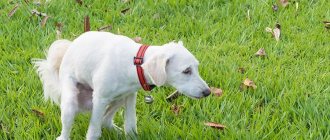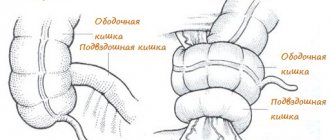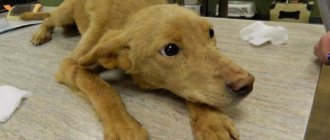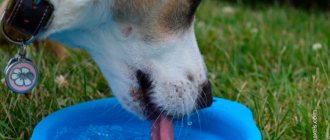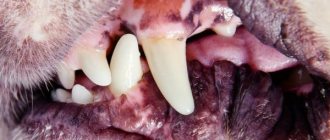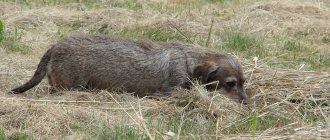An ordinary day, nothing foreshadowed trouble. You went to the toilet to relieve a natural need, but suddenly discovered blood in the stool on your Chihuahua’s diaper. This is a familiar situation, isn't it? I’ll tell you right away, don’t panic, unless there are serious reasons:
- diarrhea with excessive blood;
- feces emit a foul odor;
- accompanied by vomiting of blood, bile and foam;
- increased gas formation and bloating;
- lethargic state of the dog, apathy, convulsions;
- the stool has become light in color;
- refusal to eat and drink;
- breathing problems, the animal is suffocating;
- significant redness or yellowing of the whites of the eyes;
- purulent discharge from the eyes, photophobia;
- high body temperature (over 40 degrees), fever;
- pain in the abdominal area when pressed;
- pallor and dryness of the gums, mucous membrane of the mouth;
- bloody stools persist for two or more days.
If any of the above symptoms occur, you should immediately contact a licensed veterinarian for help. Only a veterinarian can make the correct diagnosis and provide qualified assistance to the animal. Self-medication can aggravate the current situation and lead to dire consequences.
If possible, obtain a sample of your dog's stool for laboratory testing at your veterinarian's office. Place fresh Chihuahua poop in a small, clean container and cover tightly. A stool sample remains suitable for analysis within 8 hours of defecation. This is subject to storage in the refrigerator at a temperature of 4-6°C.
Feeling good is a favorable symptom
If your Chihuahua is pooping blood, but at the same time feels great, remains active, eats with appetite, without any unusual behavioral abnormalities, then do not rush to the veterinarian.
As a rule, in 80% of such cases, the presence of blood in the stool of a Chihuahua signals gastrointestinal disorders, hemorrhagic colitis or gastritis. Occurs due to the consumption of low-quality commercial feed, a sudden change in the type of food or manufacturer. The prognosis for treatment in this case is favorable. The question is rather about the amount of blood in the excrement, the form of bowel movements (formed or liquid stools), and other manifestations of symptoms, such as vomiting.
Know that a slight presence of mucus in the stool of a Chihuahua is normal. The mucous secretion facilitates the movement of feces and acts as a natural lubricant to facilitate the process of bowel movement. However, excessive mucus in the stool, especially with blood, indicates serious bleeding in the dog's gastrointestinal tract.
If there is slight bleeding in the stool, temporarily switch the Chihuahua to Super-Premium class dietary food for dogs with sensitive digestion. For a natural diet, boil rice and chicken, removed from skin and bones. Mix in a ratio of 70% rice to 30% chicken. Feed with added probiotics as usual. The stool should return to normal within 3 days. If this does not happen, then contact your veterinarian.
High-quality treatment from specialists
We offer our visitors the highest level of modern diagnostic equipment. Yorkie poops blood Rostov-on-Don - we have the best treatment. Patients in intensive care and hospital are under constant medical supervision. The veterinary pharmacy, located in the lobby of the clinic, sells all the necessary medications to treat your pets. Here you will find EVERYTHING without long searches and with a guarantee of high quality! If necessary, you can order delivery of medicines, food and pet accessories to your home. To transport your pet, use our pet taxi, which will take you and your pet to the veterinary clinic from anywhere in Rostov-on-Don and the region. Call us, we will be happy to answer all your questions. By asking us a question you can get a free consultation with a doctor. Rest assured, by visiting the website of our veterinary clinic, you will always be able to find an up-to-date answer to your question, be it a description of a procedure or a description of rare diseases of dogs and cats. Our veterinary clinic conducts active educational work. On our website you can read articles devoted to various aspects of the treatment and care of animals, as well as a modern view of veterinary medicine.
If food poisoning occurs
If you strongly suspect food poisoning, put an adult dog on a fasting regime for 12 hours, a puppy for 6 hours. Leave water available. With food poisoning, there is a loss of strength and a depressed state. Accompanied by profuse diarrhea with blood (or without), rarely with bloody vomiting. In this case, treatment at home is allowed, but not recommended.
Give your Chihuahua the antidiarrheal drug Smecta, which has an absorbent effect. Dosage: 1/3 sachet per 50 mg of warm boiled water for oral administration. To make sure your dog does not have an allergic reaction to the drug, first give 10 mg of the drug. To do this, you can use a medical syringe with a division scale. If there is no deterioration 1 hour after administration, then give the remaining 40 mg. Repeat if necessary after 6 hours.
If Smecta is not available, activated carbon, a natural absorbent, will do. Give at the rate of 1 tablet per 10 kg of body weight. Subsequent stools will become darker in color, which is natural after taking activated charcoal.
If the dynamics are positive and normalization of feces, on the 3rd day, to bring the intestinal microflora back to normal, give the drug “Lactobifadol”. The drug will help restore normal levels of lacto and bifidobacteria in the intestines, which is important for dysbiosis. If there is no medicine in the pharmacy, treat you to regular drinking kefir.
If bloody diarrhea in a Chihuahua persists for 48 hours, you should immediately consult a specialist. The above drugs are effective only for food poisoning
, and are ineffective against poisoning by chemical and toxic substances. In case of poisoning by chemicals and poison, immediate veterinary attention is required. Otherwise - death.
When is a visit to the vet necessary?
Be sure to take your toy terrier to the vet if:
- an intestinal disorder in a dog does not go away within 1-2 days of home treatment;
- the animal’s condition worsens and the diarrhea intensifies;
- if the disorder is accompanied by lethargy, high fever, vomiting, cough, discharge from the nose and eyes, etc.
Frequent diarrhea leads to dehydration
Prolonged diarrhea can lead to an imbalance in the dog's body's water balance and subsequent dehydration, especially with frequent urination and vomiting. To compensate for the loss of important fluids for the body, the dog needs to consume a sufficient amount of water.
Dehydration of the body is indicated by rough, pale and elastic skin, dry tongue and mucous membranes. Pinch a small area of skin on the dog's back or head with your fingers and release. In normal condition, the skin will instantly return to its original shape. The fact of gradual dehydration, without timely provision of professional assistance, will lead to death.
Prevention
It is difficult to completely exclude the possibility of developing diarrhea, because a Yorkie can develop loose stools even from a stressful situation. But every owner is obliged to minimize digestive disorders in their four-legged pet. It is enough to be attentive to your pet: feed only fresh and high-quality food, make sure that the animal does not pick up anything on the street, carry out vaccinations and deworming in a timely manner.
The health of a small lap dog is entirely in the hands of its owner. When purchasing such a dog, a person must be prepared for special care for it. Whether the Yorkie will be healthy and happy depends only on its owner.
Thanks for the article, needs improvement
It is difficult to completely exclude the possibility of developing diarrhea, because a Yorkie can develop loose stools even from a stressful situation. But every owner is obliged to minimize digestive disorders in their four-legged pet. It is enough to be attentive to your pet: feed only fresh and high-quality food, make sure that the animal does not pick up anything on the street, carry out vaccinations and deworming in a timely manner.
The health of a small lap dog is entirely in the hands of its owner. When purchasing such a dog, a person must be prepared for special care for it. Whether the Yorkie will be healthy and happy depends only on its owner.
Hello! Problems with the gastrointestinal tract began at 3 months. Fed Royal Canin Junior. I ate very little when they took me. First there was vomiting of bile in the morning. We went to the doctors and had ultrasounds done. Nothing really was revealed there; chronic gastroduodenitis is suspected. I never heard a clear diagnosis from 3 clinics. Various things were prescribed during this time: Omez, kvamatel, festal, choleretic, pro and prebiotics, noshpa and more. She always ate with reluctance, but since vomiting in the morning signals malnutrition and accumulation of bile, I began to feed her 4 times a day by hand, just so she could eat. We ended up eating different flavors of Grandorf pate (she stopped eating the same thing) and bought a Royal Canin Gastro, which at first stood idle, but then she showed interest in it and began to eat it. We ended up eating pate and Royal Canin gastro. Mucus sometimes appeared in the stool. They also suggested that Royal Canin Gastro may not be suitable or may be too fatty (it even contains pork, as I understand it). When I last purchased a package, I noticed how the granules are very greasy and if left on paper they leave very greasy marks. The veterinarians advised us to go low fat, but we already weigh very little. But in general there is no clear advice, just a list of foods to choose from. We even tried to switch to straight, but she didn’t show any interest and the picture didn’t improve afterwards. Now the problem is this: there is copious mucus and blood in the stool. I'm worried about the blood. We haven’t changed the diet yet, we were prescribed Kvamatel and Lactofiltrum, everything was fine for 2 days, after a single vomiting and stool with blood, but after 2 days there was stool with blood again, she looks lethargic, she seems to be shivering and refuses to eat. I do not know what to do. We had ultrasounds, blood and stool tests. They don’t say anything, they don’t advise anything normally. This treatment does not help. We are already 1 year 3 months old, we weigh only 1.8 kg. I don’t know where to go and what other tests to take. And I no longer know what food to choose so that she can eat it and it will be healthy. I read that for some reason, if there is blood in the stool, they recommend Royal Canin for allergies (Hydrolysate), and the indications for the food are colitis and problems with the gastrointestinal tract. Maybe try it? I read that the contraindication for Laktofiltrum is bleeding in the gastrointestinal tract, why was it prescribed to us? What should we do with blood in the stool, how to treat it? Now there is a strong rumbling in the stomach. The ultrasound doesn't reveal anything to us, they say it's good. No worms or protozoa were found in the stool, and nothing was seen in the blood. I am attaching scans of the tests.
Chronic diseases: Gastroenteritis
On the Ask a Doctor service, you can consult a veterinarian on any problem that concerns you. Expert doctors provide consultations around the clock and free of charge. Ask your question and get an answer immediately!
The presence of blood in a dog’s stool is an alarming and unpleasant symptom. There are many reasons for this problem. But with any pathology, feces mixed with blood are a sign of serious disturbances in the functioning of the body. Often, owners try to cure the problem on their own at home and, in this case, a late call to a specialist can cause an unpredictable result - from a significant deterioration in the animal’s condition to death.
Let's look at why a dog might have bloody stool? What to do if an animal has this problem, what measures to take before seeing a doctor? Basic methods of disease prevention.
The main reasons for the appearance of blood in the stool of a Chihuahua
Unfortunately, bloody diarrhea does not always signal a gastrointestinal disorder or food poisoning from poor-quality food. Moreover, the stool may be properly formed, and not liquid. In any case, blood in the stool of a Chihuahua indicates one of the following ailments:
- dysbacteriosis;
- gastrointestinal disorder;
- colitis, gastritis;
- stomach ulcer;
- stress;
- parasitic infestation;
- rectal polyp;
- gastrointestinal cancer;
- bacterial or viral infection;
- poisoning (food, chemical and toxic substances);
- pancreatitis;
- parvovirus enteritis;
- carnivore plague.
Among the ailments, the greatest danger to the life of a Chihuahua is canine distemper, parvovirus and pancreatitis.
Vomiting blood can be the cause of severe poisoning with toxic and noxious substances, the presence of a foreign sharp object in the stomach, a peptic ulcer or cancer of the stomach, an infectious or helminthic disease.
Repeated vomiting of yellow foam in a Chihuahua indicates viral hepatitis, chronic gastritis, gastric or intestinal ulcers, helminthic infestation, piroplasmosis, leptospirosis, cholecystitis. Mucus in the stool indicates colitis and intestinal parasites.
Treatment of bleeding from the anus
Only a veterinarian can diagnose the cause of blood in feces.
Your pet should be examined immediately after red discharge appears in the stool.
Antiviral antibiotics are used to treat diseases caused by infections. After such antibiotics, it is recommended to take a course of the drug, which will restore the natural intestinal microflora and strengthen the dog’s immunity.
Getting rid of worms will be ensured by means that kill parasites inside the intestines. Your veterinarian will help you prescribe anthelmintic medications correctly.
If the body becomes dehydrated, it is necessary to give the dog access to fresh water and immediately contact a veterinary clinic.
Having identified the disease that caused the bleeding, there is a chance to cure the pet, but treatment should only occur under the supervision of a veterinarian.
Amateur activities and treatment with traditional methods can be fraught with consequences and cost the dog’s life.
There is a diet for a pet that is undergoing treatment. It is necessary to exclude hard bones from the dog’s diet, which can injure the stomach; products containing high acidity; food that can irritate the walls of the stomach or intestines.
Therapy for rectal bleeding involves a high-quality and balanced diet
What can the color of feces indicate?
Poop can tell a lot about the functioning of the gastrointestinal tract of its “manufacturer”. In science, there is a separate field that deals with the biological study of feces for medical purposes. It is called scatology. We will not analyze the constituent elements of excrement, but we will talk about what the color of feces can tell.
The color of normal Chihuahua stool ranges from brown to dark brown. The consistency is moderate, formed in the shape of a small-volume sausage, without the presence of foul odor and blood. Loose, liquid (watery) or too dense consistency of excrement indicates pathological abnormalities in the body.
Tarry (black) stools indicate bleeding in the upper gastrointestinal tract, particularly the stomach and small intestine. It is more common with peptic ulcers of the stomach and small intestine, poisoning with toxic chemicals.
Stool interspersed with fresh blood (hematochezia) indicates bleeding in the lower gastrointestinal tract, particularly in the colon and rectum. Color and consistency depend on the intensity of internal bleeding. This can be minor inclusions (droplets) of blood, or its abundant presence, when the stool turns scarlet or red.
Formed (natural dense consistency) stool with blood in Chihuahuas is much less common than liquefied stool. As a rule, it indicates mechanical damage to the intestines, esophagus or stomach caused by a swallowed foreign object with sharp edges. Including parasitic infestation, parvovirus, rectal polyp and colon cancer.
Abnormally light-colored feces warn of a serious malfunction of the liver or pancreas, or severe pancreatitis. The yellow ones are about canine distemper, and the green ones are about Crohn's disease and chronic pancreatitis.
Causes of diarrhea
If your pet has diarrhea, there may be several reasons for this:
- poor quality or unhealthy food;
- medications (the dog may eat them accidentally);
- toxic substances of chemical or plant origin;
- dog vitamins;
- acute viral infection, including plague;
- worms and other canine parasites;
- intestinal dysbiosis;
- avitaminosis;
- indigestion;
- entry of a foreign body into the intestine;
- allergic conditions.
Clinical diagnosis of the disease
Of course, the veterinarian will conduct a visual examination of the patient, but this is not enough to make a correct diagnosis. To make an accurate diagnosis, the following diagnostic methods are used:
Coprogram.
Microscopic analysis of stool will provide detailed information about the functioning of the digestive system. Fecal flotation allows you to determine the presence of microbiological parasites in the Chihuahua’s body that provoke intestinal bleeding and mucus in the feces:
- hookworms;
- whipworms;
- Giardia.
The veterinarian compensates for the lack of information with additional diagnostic tools.
Blood analysis.
If infectious or inflammatory processes in the body are suspected, the veterinarian will take the Chihuahua’s blood for a general analysis. To diagnose parvovirus enteritis, the total volume of red blood cells in the blood is determined.
Ultrasound.
Ultrasound examination or x-ray of the abdominal cavity is used to search for a foreign body in the gastrointestinal tract, tumor, ulcer, or intestinal blockage.
Gastroscopy or colonoscopy
carried out by a specialist for the purpose of visual inspection of the mucous wall of the stomach and colon. An optical device, an endoscope, is responsible for the visual component. The image from it is displayed on a high-resolution medical monitor. Used for diagnosing ulcerative and cancerous tumors in the gastrointestinal tract, mechanical injuries.
The veterinarian will need the following information from the owner:
- What does a dog eat every day?
- How long have symptoms been present?
- What vaccinations were given and when?
- Date of last deworming?
- What other symptoms are there?
Check the integrity of toys and packages containing household chemicals and toxic substances. There are cases of poisoning with poisonous agents used to kill cockroaches and mice.
Examination and diagnosis
Determining the severity of the disease in an animal and its severity involves a number of examinations:
- visual inspection of the dog;
- stool examination;
- examination of the rectum;
- ultrasound diagnostics of the peritoneum;
- performing a colonoscopy or gastroscopy (depending on the color of the blood impurity).
For a correct diagnosis, the information that is required from the dog owner also matters a lot:
- timing of the onset of symptoms of the disease;
- whether deworming was carried out in a timely manner and when;
- what kind of diet does the pet have (does it chew bones, picks up food or other objects from the ground);
- does he suffer from loss of appetite, etc.
Based on all this, a diagnosis is established, and a treatment regimen is determined accordingly. Elimination of blood from stool is possible only if the root cause that caused such a symptom is cured. Therefore, do not delay your visit to the veterinary clinic with your four-legged friend. Not only his health, but possibly his life will depend on the speed of your actions.
Treatment for bloody stools
Treatment is selected by a veterinarian based on the diagnosis and general condition of the animal.
First of all, bleeding is stopped with the help of hemostatic drugs: “Vikasol” or “Ditsinon”. In case of significant dehydration, in order to normalize the water-electrolyte balance in the body, a 5% Glucose solution or Ringer's solution is injected intramuscularly. To replenish the volume of circulating blood: Chemodex, Refortan.
For colitis and gastritis, dietary nutrition is indicated, which is easily and without discomfort absorbed in the dog’s digestive tract. Verakol will have a complex effect on the gastrointestinal tract. The drug has antibacterial, anti-inflammatory, antispasmodic and stimulating effects. Available in the form of drops and tablets.
Stomach ulcers require a comprehensive approach. Omeprazole or Ranitidine is prescribed to reduce the acidity of gastric juice. “Almagel” and “De-Nol” have an enveloping effect and neutralize the aggressive environment in the stomach. "Cerucal" stops vomiting, and "Smecta" stops diarrhea. In case of bacterial (Helicobacter pylori) form of the disease, antibiotic therapy is additionally indicated.
Infestation by helminths and protozoa is treated with anthelmintic drugs: Milbemax, Drontal, Dirofen and Kanikquantel Plus. Enterosorbents will help to avoid intoxication of the body: “Activated carbon”, “Enterosgel”, “Polysorb”. They are also used for poisoning.
Treatment of cancer and polyps requires surgery and radiation therapy. “Phytoelita” is prescribed as a cytostatic drug: “Cytostat” or “Metastop”. Available in tablet form. For injections: “Ligfol”, “Teranekron”, “Recoferon Gamma”.
A foreign object in the digestive tract is removed surgically only if there is a threat of intestinal blockage or worsening of the dog’s general condition. If the item is able to pass naturally, warm Vaseline oil will help ease its movement through the digestive tract. Used orally or rectally as an enema.
If the disease is bacterial in nature, antibacterial therapy with complex action antibiotics is prescribed: Nifuroxazide, Chloramphenicol, Betamox, Cefazolin, Ciprovet, Biseptol and others.
Probiotics will help restore the balance of intestinal microflora against the background of dysbiosis: “Lactoferon”, “Bifitrilak”, “Vetom 1.1”, “Bifidumbacterin”, “Bactoneotim”, “Lactobifid”.
Complex remedies for gastrointestinal disorders accompanied by bloating and diarrhea: “Canigest”, “FortiFlora”, “Evitalia-Vet”. Used as a dietary supplement to stimulate and normalize the digestive system.
Immunostimulants: “Ribotan”, “Fosprenil”, “Glycopin”, “Imunofan”. Taken as an additional therapeutic or prophylactic agent to strengthen the dog’s immune system during viral infections and immunodeficiency.
The names of medications are given as an example. The decision to use this or that product is made by your attending veterinarian! Self-treatment can worsen the general condition of a sick animal!
How to treat?
If your pet has an intestinal disorder, then the only correct approach is comprehensive treatment.
It includes:
- special diet;
- taking herbal decoctions and infusions;
- taking medications.
On the first day of illness, the animal should not be given any food at all; keep the dog on hunger for about a day, giving only boiled water at room temperature. This will allow the intestines to be completely cleansed and the body to recover. Perhaps this measure alone will be enough to defeat the disease.
If the dog feels better, on the second day you can offer it low-fat fermented milk products to restore intestinal function.
On the third day, you can already give boiled chicken, fish or a boiled egg.
It is advisable to give your pet boiled rice during all three days.
It should be remembered that throughout the entire period the dog needs plenty of fluids.
In order to help your pet recover faster, you can prepare herbal infusions and give it as a drink.
It can be:
- blueberries brewed in a thermos;
- sage;
- St. John's wort;
- alder fruits.
A decoction of these plants has a “strengthening” effect and perfectly restores normal intestinal function.
As a medicine for diarrhea, a toy terrier is given:
- Regidron. The drug is available in powder form, which is diluted with water;
- glucose is given to the pet in case of severe dehydration and as maintenance therapy;
- antibiotics are taken only as prescribed by a veterinarian and only when the cause of diarrhea is an infection;
- anti-inflammatory drugs are prescribed to the dog if it has a fever;
- Antiparasitic drugs are prescribed individually, not only as treatment, but to prevent the appearance of parasites.
What to do if your dog has mucus in his stool
So, we found out what are the main reasons for the appearance of mucus in the feces of an animal. Now it’s time to clarify what treatment is required in each of the cases that lead to the appearance of a large amount of mucus in the stool:
- For bacterial colitis, animals are usually given antibiotics, antispasmodics and anti-inflammatory drugs. The dog is prescribed a therapeutic diet with special food;
- Enterocolitis is treated with antibiotics, antispasmodics, enzyme preparations and adsorbents. In the first days of treatment, dogs are prescribed a diet with special food, or rice broth with boiled chicken;
- Gastritis is treated with antibiotics, antacids, antiemetics and proton pump inhibitors, and antispasmodics. Plus, the animal is prescribed a diet (special food in frequent and small portions, or rice with meat in the same dosages);
- If a dog has gastroenteritis, then, as a rule, the administration of antimicrobial drugs, adsorbents, analgesics and antispasmodics is required. The animal is prescribed a gentle diet;
- When mucus in the stool is caused by a stomach ulcer, surgery is required to remove the ulcer. Also, a sick dog may require antibiotics, antispasmodics and painkillers, anti-inflammatory, antiemetic and enveloping agents, drugs that suppress the production of hydrochloric acid, antacids;
- If the dog has worms, then you cannot do without the use of deworming drugs (Profender, Milbemax, Drontal, Kanikvantel, Dirofen, Prazitel, Cestal, etc.).
The copious amount of mucus contained in the stool whenever the dog relieves itself is considered a dangerous symptom of many digestive ailments. An owner who notices mucus in their pet’s feces should contact a veterinary clinic as soon as possible, where a specialist will determine what ailment has affected the animal and then prescribe the correct treatment. The presence of mucus in your pet's feces should not be ignored.
Interpretation of results and rules for donating feces for dogs and cats
The material is collected in a special disposable sterile container, which can be purchased at the pharmacy. Using the plastic spoon that comes with the container, you need to select a little stool from different places and then send it to the laboratory for analysis as soon as possible.
design, density, characteristic smell. If there are disturbances in the functioning of the gastrointestinal tract, these signs include liquefied or mushy stools, as well as the presence of mucus and large amounts of water. The medical staff of a veterinary clinic can, based on the changed shape of stool, suggest an oncological neoplasm of the rectal sphincter.
There is normally no putrid or fetid odor, as is sour odor. All this more indicates a disease of the pancreas and cholelithiasis.
The color can be different, but it can also change with an unbalanced diet or a special diet, for example, turning yellow from consuming a large amount of dairy products. A formidable prognostic sign is dark, almost black stool or a mass streaked with blood, as it signals the onset of intestinal bleeding.
Already under a microscope, in contaminated feces you can see either helminth eggs or adult individuals, as well as undigested parts of food and neoplasm cells. Thanks to culture for the growth of microorganisms, it is possible to find out which bacteria are the cause of the disease. After a microscopic examination, the acidity or pH of the stool is determined, normally ranging from 5.5 to 7.0 - slightly acidic or neutral.
It is difficult to completely exclude the possibility of developing diarrhea, because a Yorkie can develop loose stools even from a stressful situation. But every owner is obliged to minimize digestive disorders in their four-legged pet. It is enough to be attentive to your pet: feed only fresh and high-quality food, make sure that the animal does not pick up anything on the street, carry out vaccinations and deworming in a timely manner.
